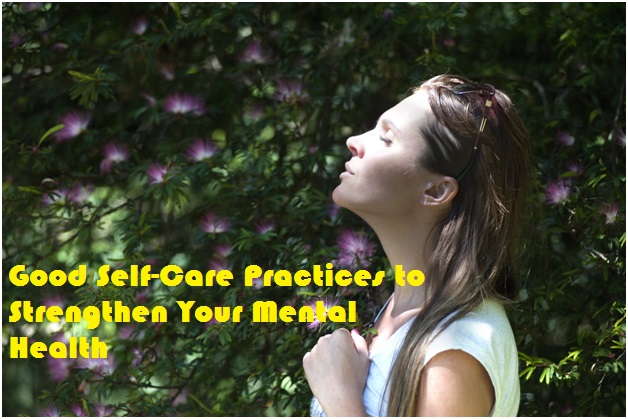Good Self-Care Practices to Strengthen Your Mental Health:
We must take proper care of our bodies and minds to function at optimal levels in our busy, stressful daily lives. With all our responsibilities, we sometimes overlook necessary self-care, and this can spiral down into depression and illness. However, a few simple techniques can do wonders for improving mental health and emotional well-being.
Feed the Brain
Our bodies need good, nutritious food the same way our cars need fuel. Avoid running on empty by replacing the junk with smart choices. Swap processed carbohydrates and sugar for a balanced diet that contains the proper micronutrients. Focus on getting healthy fats and proteins and plenty of fresh produce. We need omega 3 fatty acids, which are found in fish, for good cognitive functioning. Healthy whole grains release glucose more slowly, providing a steady stream of fuel for the brain. Lean proteins keep serotonin levels balanced, improving mood and combating depression. Leafy greens can provide ample dietary folate to help prevent fatigue and depression. Fermented foods like kimchi and yogurt provide probiotics. Moreover, healthy bacterial cultures that reduce anxiety and stress response and improve gut bacteria. Good nutrition is a vital tool for maintaining physical and mental health.
Get Your Rest
Studies show that sleep deprivation goes hand in hand with depression and mental illness. Prioritize your sleep; give yourself at least eight hours a night. Sometimes sleep problems stem from what we’re sleeping on, as an old, worn-out mattress can make restful sleep nearly impossible. If it’s been years since you bought a mattress, it might be time to swap yours out for a new one. And while buying a mattress is a sizable investment, you don’t have to spend your life savings on one. In fact, there are several full-size options available that are cheaper than a king- and queen-size mattresses.
However, if you’ve got a great mattress and you’re still having trouble, you can help yourself get sleepy by cutting out caffeinated beverages in the afternoon and evening. Set up a nighttime relaxation ritual. Such as a warm bath, a good book, and a cup of herbal tea or warm milk to soothe you. Consider journaling or meditating to relax before bed.
Learn To Relax
Along with getting enough sleep, learning to relax can be a great benefit to your mental and emotional health. The stress response is a normal, adaptive response to a threat, but when it rears up in relation to a daily routine, it can be counterproductive. Chronic stress can cause depression and trap you in a cycle of negative thinking. Fight back by learning ways to short-circuit the stress response. Relaxation lowers blood pressure and heart rate and controls the flow of stress-related hormones. Practice breathing exercises, learn guided meditation and positive visualization and take up yoga or tai chi. Mindfulness meditation can even help you to deal with pain, anxiety, and depression.
You can easily set up a meditation space in your home, with yoga mats, scented candles, and pleasant pictures for visualization. To make your whole home less stressful, remove clutter, keep tidy, and try to incorporate as much natural light as you can. Consider implementing a cut-off time for electronics in the evening. In addition, allow the family to come together and de-stress before bedtime.
Learn When to Say Yes and When to Say No
People sometimes feel obligated to accept every invitation. Moreover, then they dread the events on their schedule and don’t enjoy them when they arrive. Learn to evaluate every offer and request in terms of whether you want to expend the time and energy they require. It’s perfectly fine to decline, and people will understand. Chances are, they’re just as busy as you. Practice saying, “I would love to, but I’m just too busy at the moment.” By the same token, it’s okay to say yes if you want to. Sometimes we’re afraid to try new things or meet new people. Social anxiety can lead us to reject the unknown. But saying yes to new experiences opens the door to new possibilities and can lead us to new opportunities for growth and experience. Just make sure your decisions stem from your own willingness and desire — not a social obligation and politeness.
Good self-care means prioritizing your own health and making time to meet your own needs. However, by taking better care of yourself, you’ll make yourself stronger, more resilient, and better able to bounce back from misfortune. Only by replenishing your emotional reserves can you maintain your energy levels enough to do and be your best every day.
